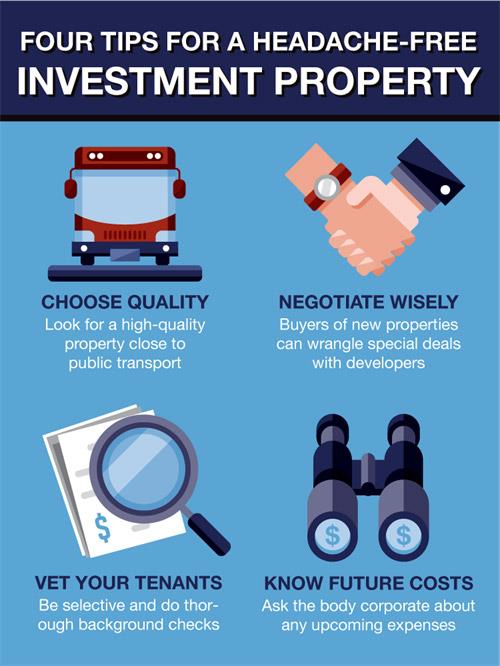 No one wants their property investment to become a source of stress. Earning a passive income (for very little effort) is the dream scenario for investors.
No one wants their property investment to become a source of stress. Earning a passive income (for very little effort) is the dream scenario for investors.
Fortunately, there are steps you can take to ensure your investment is low-maintenance and delivers a healthy return.
Choose quality
There are three issues to consider when you’re looking for an investment-grade property: the area, the land and the building, says Antony Bucello, a director of Sydney-based buyer’s agent and property-management firm National Property Buyers.
It may be a real-estate cliché, but location really should be your top priority. Ideally, your property should be close to efficient infrastructure such as roads, public transport, shops and schools. Also consider future infrastructure – what new services are coming – and population growth, he says.
Look at the land size and orientation, and avoid properties on steep, sloping blocks. These can have limited resale value as people with small children and retirees may see them as a hazard. You want a piece of land that is as low maintenance as possible – for example, easy to mow.
As for the building itself, ensure the property has been well-maintained, that there’s good natural light, a sensible floor plan and, preferably, an updated kitchen and bathroom. Additions such as solar panels are a drawcard as tenants can save as much as $1,000 a year on their energy bills.
Know future costs
Wise investors do their research on upcoming costs before purchasing so they aren’t caught by surprise when a huge bill arrives.
If you’re in the market for an apartment, get in touch with the body corporate, recommends Sandra Reece, director of West Australian Apartment Advocacy, which supports people who live in apartments.
'When buying into an older building you definitely should ask to see the council of owners’ [or strata committee] previous minutes and also their budget – because if they’ve had a situation where they have to replace or repair something major, it will cost you,' Reece says.
'If someone’s selling, it could be because they can see an expensive bill coming and it might be cheaper for them to sell and get out.'
Experts recommended budgeting 1 per cent of the value of a property for annual maintenance costs. So, if your investment property is worth $450,000, you can expect to pay about $4,500 a year in maintenance and repairs. That figure looks a lot different if you buy an investment property through DHA, however, as DHA will cover the cost of most non-structural repairs and maintenance, including grounds and gardens and like-for-like replacement of fixed appliances, such as dishwashers or stoves.
Vet your tenants
Tales of bad tenants are legendary: from months and months of unpaid rent, to homes left virtually unlivable due to neglect and damage. Which is why it’s absolutely essential to vet any tenants thoroughly. Proof of a tenant’s identification and income are the first factors every landlord needs to check. But don’t leave it at that.
Go one step further by phoning your tenant’s recent landlord or property manager. Ask if they paid the rent on time, how well they kept the home and whether the bond was refunded in full.
Tenancy-check services can also give you extra peace of mind by screening for other issues such as bankruptcy and court judgements.
Negotiate wisely and do your research
Buying off-the-plan is a popular way for many people, from first-home buyers to downsizers, to invest. Investors can be attracted to brand-new properties with little or no need for immediate repairs.
And investors often have powerful negotiating points, particularly with apartments, says Reece. 'Before I put an offer in for my apartment, I had two real estate agents meet me on site, inspect it and give me an appraisal about what they thought I would get rent-wise,' she says.
While negotiation isn’t an option when buying an investment property through DHA, it’s essential to do plenty of research before you take the step to buy. Investigate the areas where DHA has properties available, looking at current and future infrastructure, population trends and likely growth, along with factors such as transport, hospitals, schools, recreation facilities and shopping .
Look at the details of DHA’s guaranteed rent agreement, including the “rental floor”, which ensures your rental income will never be lower than where it started.